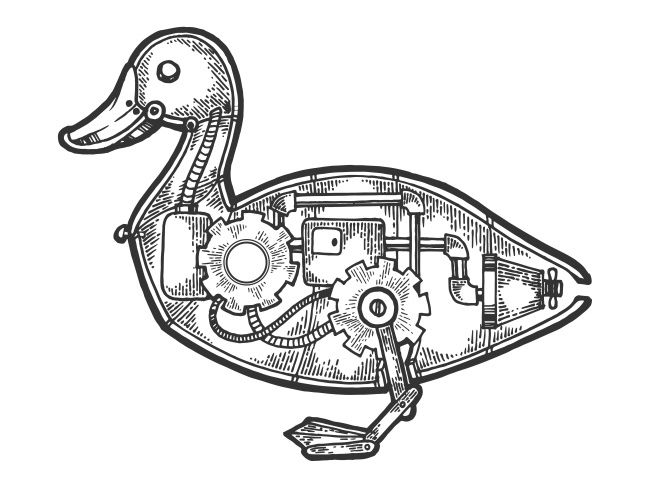Quick Links
A senior engineer at Google has claimed that the company's LaMDA AI has become sentient. Whether you find this alarming or exciting, it's a mighty bold claim, and perhaps one that's hard to prove even if it were completely true.
What Is LaMDA?
LaMDA is short for Language Model for Dialog Application. In other words, it's a machine learning language model that's specifically designed to generate natural dialogue. Machine learning methods allow computers to discover patterns and relationships in data. So, for example, you can "train" a machine-learning algorithm such as GPT-3 (another cutting-edge system) on all of the works of Shakespeare and then have it generate new original texts that read like Shakespeare.
As Sundar Pichai (CEO of Google) explains in an interview with Yahoo Finance, LaMDA is a system that's different because it's been trained on dialogue specifically. The intent is to give Google's systems the ability to engage in human-like open-ended dialogue with users.
In other words, people asking Google products for specific things don't have to change how they think or speak. They can interact with the computer system in the same way that they would interact with another person.
Under the hood, all current machine learning models are in effect sophisticated mathematical and statistical models. They generate algorithms based on the underlying patterns they discover in data. Feed them enough high-quality data, and those algorithms become astoundingly effective at doing things that only humans or other natural intelligences have been capable of so far.
Why Does a Google Engineer Believe LaMDA Is Sentient?
The engineer in question is Blake Lemoine, who published an interview between himself and LaMDA as part of his case for why LaMDA might be sentient. Lemoine spent months in conversation with the software interrogating it, asking it complex questions, and finding it hard to believe that its complex and appropriate responses could be the product of anything other than a sentient being.
It's best that everyone who wants to understand why Lemoine feels this way read through LaMDA's responses for themselves to understand why this is such a compelling position to take. LaMDA's responses are so humanlike that they're reminiscent of the fictional personal assistant AI's from Spike Jonze's Her, a story where a human develops a serious relationship with a conversational AI.
Setting aside whether Lemoine's assertions about LaMDA carry any weight, it's worth noting that LaMDA's entire design purpose is to generate natural, believable open-ended dialogue. So, in that sense, his conviction indicates Google has achieved spectacular success at generating believable dialogue. If any AI system was going to convince a human that it was sentient, it's most likely to be one that's specifically designed to do just that.
The problem is that claims of sentience aren't really testable (or at least not feasibly, or ethically testable) for a number of scientific and philosophical reasons. To understand why, we have to briefly look at what "sentience" means.
What Is Sentience?
The word "sentience" essentially means that something (a cat, a human, or a magic carpet) has the capacity to feel. it shares the same root word as "sentimental" or "sentiment". Sentience doesn't just mean something has the ability to sense. Your thermostat is almost certainly not sentient despite its ability to tell the temperature. Instead, sentience is about subjective experience of feelings, which implies that there's a "subject" in the first place.
It's dangerous to get caught up in semantics here because it's likely that Lemoine is using the word "sentience" interchangeably with distinct concepts like "sapience," "intelligence," and "consciousness." So for the sake of argument, the most charitable interpretation here is that Lemoine thinks Lamda is a self-aware being, capable of feeling things, holding beliefs, and otherwise experiencing things in a way we'd usually attribute to living creatures.
In an additional piece, Lemoine discusses what he thinks LaMDA "wants" and "believes", which supports the idea that "sentience" in his view means more than its strict dictionary definition.
We Don't Understand Sentience and Consciousness in the First Place
Here's the thing: we know relatively little about sentience, consciousness, intelligence, and what it means to be an entity that possesses those attributes. Somewhat ironically, machine learning technology may eventually help us crack some of the mysteries about our minds and the brains they exist within.
For now, philosophers and scientists are chipping away at the "black box" of consciousness, but it still seems to be the result of something more than the sum of its parts. Consciousness appears to be an "emergent" thing. It's a "ghost" that's generated from the interaction of many different neural subsystems, not one of which appears to be sentient by itself.
Similarly, sophisticated AI such as the DALL-E 2 image generation system, consist of simpler machine learning models that feed into each other to create the final product. The theme of complexity arising from the interaction of simpler systems is one you'll encounter often in the world of AI, and although we may have a very good understanding of how each subcomponent works, the final results are usually quite unpredictable.
Would We Even Recognize Sentience in AI?
If, for the sake of argument, an AI were actually sentient in the truest sense of the word, would we even be able to tell? LaMDA was designed to mimic and predict the patterns in human dialogue, so the deck is really stacked when it comes to triggering the things humans associate with human-like intelligence. However, it's taken us a long time to consider non-human primates and animals such as dolphins, octopuses, and elephants as sentient---even though in the grand scheme of things they're virtually our siblings.
A sentient AI may be so alien that we wouldn't know that we were looking at one right in front of us. This is especially likely since we don't know what the threshold conditions are for sentience to emerge. It's not hard to imagine that the right combination of data and AI subsystems mixed together in the right way may suddenly give birth to something that would qualify as sentient, but it may go unnoticed because it doesn't look like anything we can understand.
If It Looks Like a Duck...
The last big problem with claims of sentience in machines is the same problem with claims of sentience in anything else, including human beings. Philosophically, you don't know if any of the people you interact with are actually sentient or not. It's the classic philosophical zombie problem, which is a thought experiment about hypothetical beings that are completely indistinguishable from a human being, except that they lack sentience or any type of conscious experience.
However, as Alan Turing's famous test posited, it doesn't matter whether an AI is "really" thinking and feeling. What matters is that it can imitate the appearance of thinking and feeling so well that we can't tell the difference. Depending on who you ask, LaMDA has already passed the Turing Test, which might make Lemoine's untestable claims a moot point.



